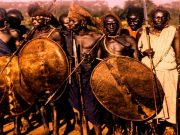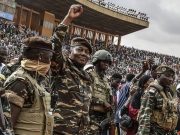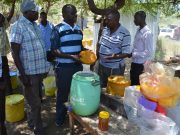In late 2025, the world woke up to images and testimonies from Tanzania that felt unreal. A country long known for political calm had become the site of mass killings, disappearances, and entire communities living in fear. Independent human rights groups estimate that more than a thousand people have been killed since the disputed October 29 election, with some estimates climbing far higher. The United Nations has expressed alarm, and churches across the country have condemned the atrocities. Tanzania now faces the deepest political crisis since the day it hoisted its independence flag.
To understand why this moment should shake the continent, we must return to a chapter many younger Africans were never taught: Tanzania once stood at the center of Africa’s liberation. It carried the burdens of other nations when those nations could not speak or fight for themselves. If Tanzania stood with Africa then, Africa has a moral duty to stand with Tanzania now.
In the 1960s and 70s, Dar es Salaam became the beating heart of African liberation. It was a base for exiles, guerrilla movements, and revolutionaries from across the continent. Julius Kambarage Nyerere, Tanzania’s founding father, made a deliberate choice: his young, poor nation would commit itself to helping dismantle colonialism in Africa. That choice changed the course of the continent.
Dar es Salaam gained this stature because Tanzania offered its territory, its diplomacy, its meagre resources, and sometimes its very security to African movements. The Organisation of African Unity placed its Liberation Committee headquarters in Dar es Salaam, turning Tanzania into the coordinating center for anti-colonial struggles. Camps in Kongwa, Mgagao, Ruvu, Morogoro, Mazimbu, and Dakawa trained fighters, housed exiles, educated children, and created temporary societies of hope and discipline. Tanzania risked the anger of colonial and apartheid governments because it saw African freedom as a duty, not a favour.
The list of movements that took root on Tanzanian soil reads like a roll call of Africa’s modern nations. Mozambique’s FRELIMO was formed in Dar es Salaam in 1962, and Eduardo Mondlane planned the guerrilla war against Portuguese rule from there. South Africa’s ANC and PAC reorganized in Tanzania when apartheid sought to silence them; their fighters trained in Kongwa, Mbeya, Bagamoyo, and Morogoro. ZANU and ZAPU fighters from Zimbabwe trained in the same Tanzanian camps, sometimes side by side with South Africans and Namibians. SWAPO, fighting for Namibian independence, relied heavily on the political and logistical refuge that Tanzania offered. Angola’s MPLA maintained a presence in Dar es Salaam, using it as an international organizing point in the struggle against Portuguese domination.
Even beyond Africa, Tanzania embraced causes of global liberation. The Palestine Liberation Organization opened offices in Dar es Salaam. Revolutionary figures from Latin America and the Black diaspora travelled there, linking their struggles with African anti-colonial movements. Tanzania became a university of resistance, where conversations in markets, churches, mosques, and classrooms exposed ordinary Tanzanians to the reality that their own independence was tied to the freedom of others.
Tanzania paid a heavy price for this solidarity. It diverted land, money, and food toward supporting tens of thousands of exiles. It risked military retaliation and lived under the watchful eye of powerful governments who disliked its moral clarity. Yet Nyerere held firm, believing that African unity and liberation were national interests as urgent as poverty reduction or state-building.
That history matters today, because justice is not only about memory; it is about reciprocity. Tanzania once protected those who had nowhere else to run. Today, its own people are the ones searching for protection. After an election barred major opposition candidates, the state responded to nationwide protests with live ammunition, night raids, mass arrests, and an internet shutdown designed to hide the violence. Entire neighborhoods now whisper about missing family members, bodies buried secretly, and security units acting without restraint.
Many African governments have responded with silence or carefully measured statements. Their hesitation comes from fear. A strong response to Tanzania’s crisis would set a precedent that sitting presidents across the continent find dangerous. It would suggest that state violence will not be forgiven in the name of stability. It would imply that legitimacy depends on respecting life, not merely holding power.
This is why the responsibility shifts to ordinary Africans.
During the liberation struggles, African solidarity was not built by presidents alone. It was built by student unions, churches, mosques, labor movements, exiled intellectuals, cross-border communities, and citizens who believed freedom in one country strengthened freedom everywhere. That same spirit is needed now. Tanzania does not need pity. It needs a community of African voices insisting on truth, insisting on accountability, insisting that African lives are not bargaining chips in the game of incumbency.
Standing with Tanzania today means demanding an independent investigation into the killings, amplifying the testimonies of survivors, supporting Tanzanian journalists and activists in exile, and forming people-to-people coalitions that can provide legal, medical, and humanitarian support. It means reclaiming Pan-Africanism from summit speeches and returning it to the realm of sacrifice, courage, and solidarity.
In the 1960s, when Mozambique could not organize openly, FRELIMO used Dar es Salaam as its headquarters. When ANC leaders could not operate freely, they travelled to Tanzanian camps to regroup and learn. When Namibian and Zimbabwean fighters faced extermination on their soil, Tanzania gave them a place to stand and fight. Tanzania’s sovereignty became a shield for those who lacked it.
Today, history has reversed the roles. Tanzania’s people are the ones seeking a shield.
If Tanzania once stood with Africa, the question now is whether Africa will stand with Tanzania. The answer must come from Africans who remember, or who are willing to learn, what Tanzania once represented. By defending Tanzanian lives today, we honour Nyerere’s legacy and begin sketching a new Pan-Africanism — one rooted not in slogans but in the protection of life and the defence of human dignity.
Tanzania helped many of our nations to be born. As it cries out for solidarity, the continent now has the chance to show that those sacrifices were not forgotten.
























